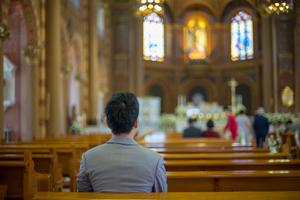Kirill-Francis Meeting in Danger of Being Over-Hyped
Russian President Vladimir Putin understood to be meeting’s key protagonist.

Pope Francis’ momentous meeting with Patriarch Kirill of Moscow tomorrow has “serious ecumenical import and potential” but it should be neither “hyperbolized nor underestimated”, the head of the Department of External Church Relations for the Ukrainian Greek Catholic Church has said.
In a commentary written on the eve of the historic meeting, Bishop Borys Gudziak said he was pleased the meeting is taking place, adding that it is a “welcome sight” when “estranged brothers take a new first step towards each other.”
But he stressed that the meeting should not be over hyped nor played down but seen in context. That context, he pointed out, is a Russian Orthodox Church that has lost its civic standing in the Russian population and is looking to boost its moral authority.
The Russian Orthodox, he added, has also been “in a lasting dialectic” with the Patriarchate of Constantinople, and noted that around half of its flock live in Ukraine and want to be independent of Moscow.
Bishop Gudziak doesn’t expect “revolutionary results” from the meeting but hoped that through such an encounter” a “spiritual change” can occur.
Yury Avvakumov, a specialist in the history of Russian and Ukrainian theology and in the history of the Eastern Catholic Churches at the University of Notre Dame, believes there is “too much enthusiasm, unfounded hopes, and naïve mythology in the media” about the upcoming meeting.
It is taking place “against the backdrop of current Russian military, political, and propagandist actions,” he said, and urges those engaging with Russia’s leaders to have a ‘business as usual’ attitude.
He added: “Of course, to have the Roman Pope, with his internationally recognized authority, not as a critic but as an ally or at least simply as a neutrally silent figure, is highly attractive to Putin and his associates.”
An informed source, who was aware the meeting was going ahead months before last week’s announcement, told the Register Feb. 11 that Russian President Vladimir Putin has been the key protagonist behind the meeting.
The possibility was discussed at both private audiences Putin had with Pope Francis (in November 2013 and June 2015) and took on an extra urgency after Russia became pariah among world nations after its annexation of Crimea in March 2014. Among other interests, Putin allegedly saw the Catholic Church as an important ally in the face of global opposition. The Holy See allegedly saw Russia as a powerful partner in helping to protect Christians from Islamist forces in Syria.
Prospects for the Kirill-Francis meeting were apparently further helped when the prelate of Opus Dei, Bishop Javier Echevarría, visited Moscow in November 2014.
Avvakumov believes the Moscow Patriarchate, which has always been an instrument of Russian international policy, “remains an effective transmitter worldwide of the political interests of the Russian rulers.”
He added that it would be “misguided” to hope that Kirill, being close to Putin, “could contribute to persuading the Russian president to stop Russian aggressive policy and to change his attitudes.”
“This is impossible for a very simple reason: Kirill himself is one of the creators of the present-day Russian aggressive political ideology,” Avvakumov said.
“The Patriarch of Moscow was the first who, during his 2010 visit to Ukraine, introduced the concept of the so-called “Russian World” into Russian ideological discourse.”
Kirill’s visit, he said, “took place under the slogan ‘Three peoples–Russians, Ukrainians, and Byelorussians–are the one Holy Rus’ by which the existence of independent Ukrainian and Belorusian nations was, in fact, denied. Today, after two years of the bloody conflict unleashed by Russia, thousands of Ukrainians have been killed under the ideological pretext of the restoration of the one 'Holy Rus.'"
- Keywords:
- ecumenism
- holy see
- patriarch kirill
- pope francis
- russia
- russian orthodox church
- ukraine
- vladimir putin


















